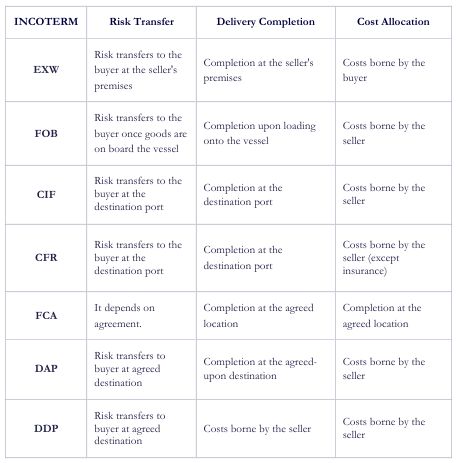- within International Law topic(s)
- in United States
- with readers working within the Law Firm industries
- within International Law, Finance and Banking and Energy and Natural Resources topic(s)
Introduction
INCOTERMS, or International Commercial Terms, are a set of standardized international trade terms published by the International Chamber of Commerce (ICC). These terms are widely used in international contracts to define the respective roles and responsibilities of buyers and sellers during the shipment and delivery of goods. The primary purpose of INCOTERMS is to provide clarity and consistency in global trade transactions by establishing a common understanding of key logistics and cost-related issues.
INCOTERMS were first introduced by the ICC in 1936 and have since undergone several revisions to adapt to the changing global trade landscape. The most recent version is INCOTERMS 2020.
Key Objectives:
The main objectives of INCOTERMS include:
- Defining the point at which the risk and responsibility transfer from the seller to the buyer.
- Allocating costs associated with transportation, insurance, and other logistical aspects of the transaction.
- Facilitating smooth communication and understanding between parties involved in international trade.
Structure
INCOTERMS are organised into groups based on modes of transport. The terms suitable for any mode of transport include: EXW (Ex Works), FCA (Free Carrier), CPT (Carriage Paid To), CIP (Carriage and Insurance Paid To), DAP (Delivered at Place), DPU (Delivered at Place Unloaded), and DDP (Delivered Duty Paid).
Terms specific to sea and inland waterway transport include: FAS (Free Alongside Ship), FOB (Free on Board), CFR (Cost and Freight), and CIF (Cost, Insurance, and Freight).
Commonly Used Incoterms
Some INCOTERMS are more commonly used than others, depending on the nature of the goods, the mode of transport, and the preferences of the parties involved. For example, terms like FOB and CIF are frequently used in maritime transactions, while EXW is common in various industries.
Below is a compilation of some of the commonly utilised INCOTERMS essential for international trade:
EXW (Ex Works):
The seller provides the goods at their premises, with the buyer responsible for loading. While applicable to any mode of transport, it is recommended for domestic transactions. The seller's obligations are limited to assisting the buyer in obtaining export licences, and the buyer must offer proof of export. Thus, it places the onus on the buyer, requiring them to manage the entire shipping process. The responsibility commences at the supplier's warehouse and extends to the final destination. For international trade, FCA is often more suitable.
FOB (Free on Board)
The seller provides the goods at their premises, with the buyer responsible for loading. While applicable to any mode of transport, it is recommended for domestic transactions. The seller's obligations are limited to assisting the buyer in obtaining export licences, and the buyer must offer proof of export. Thus, it places the onus on the buyer, requiring them to manage the entire shipping process. The responsibility commences at the supplier's warehouse and extends to the final destination. For international trade, FCA is often more suitable.
CFR (Cost and Freight)
It is similar to CIF; CFR places the responsibility for costs and freight on the seller until the goods reach the destination port. However, the buyer is accountable for insurance. This term signifies that the seller is responsible for covering the transportation costs and freight charges to bring the goods to a specified port of destination.
FCA (Free Carrier)
FCA, or free carrier, is commonly used in both domestic and international trade and provides clarity on the point at which the risk and cost are transferred from the seller to the buyer. It dictates that the seller is responsible for delivering the goods to the carrier specified by the buyer at the agreed-upon location.
DAP (Delivered at Place)
It is suitable for both domestic and international sales; the seller delivers when the goods are ready for unloading by the buyer at the named place. Thus, the term obliges the seller to deliver the goods to the buyer at a mutually agreed-upon destination. All import customs formalities and costs are the buyer's responsibility.
DDP (Delivered Duty Paid)
Applicable to any mode of transport, it places the maximum obligation on the seller, as it requires the seller to take care of all aspects of the transportation, including costs, risks, and customs duties, until the goods are delivered to the buyer at the specified destination.
Responsibilities at different stages: risk transfer, delivery completion, cost allocation:

General considerations regarding INCOTERMS in intra-African trade
When it comes to intra-African trade, it is important to note that INCOTERMS are internationally recognized, and their use is not region-specific. They can be applied to trade transactions between African countries in the same way they are applied to transactions involving countries from other continents.
Here are some general considerations and points regarding INCOTERMS in intra-African trade:
1 2 3 Adoption in Contracts: Intra-African trade contracts can adopt any of the standard INCOTERMS, such as EXW, FOB, CIF, etc., based on the preferences and agreements of the parties involved.
Consideration of Local Laws and Practices: While using INCOTERMS in intra-African trade, it is essential to consider local laws and practices that may impact the interpretation and enforcement of these terms.
ICC Guidelines: Parties engaging in intra-African trade transactions are encouraged to refer to the latest version of the ICC's INCOTERMS rules for guidance on choosing the most appropriate terms for their specific transactions.
Conclusion
INCOTERMS exhibit a remarkable degree of flexibility, making them adaptable to the diverse trade situations prevalent in transactions between African countries. This adaptability fosters efficiency and ease in cross-border transactions.
The selection of the appropriate INCOTERM is pivotal, as it should align with the unique needs and preferences of the parties involved in the international trade transaction. The flexibility of these terms allows for tailoring agreements to specific circumstances.
The comprehensive and strategic application of INCOTERMS contributes significantly to the efficiency and success of international trade transactions. By providing clarity in responsibilities and mitigating risks associated with global commerce, INCOTERMS play a crucial role in fostering a robust and reliable international trade framework.
REFERENCE
INCOTERMS 2020 Rules
The content of this article is intended to provide a general guide to the subject matter. Specialist advice should be sought about your specific circumstances.



